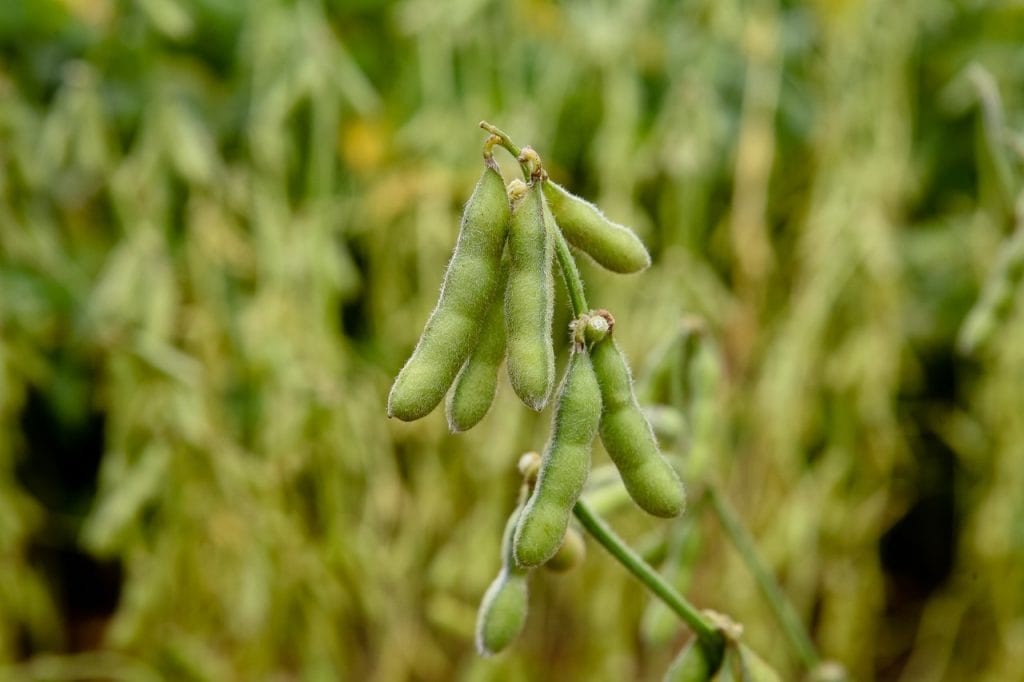Edamame, a nutritional powerhouse packed with vitamins and plant-based protein, is a popular choice for health-conscious individuals, but Is Edamame A Low Carb Food? At FOODS.EDU.VN, we break down the carb content, nutritional benefits, and potential drawbacks of incorporating this legume into a low-carb diet. Discover delicious recipes and keto-friendly alternatives to help you make informed choices for your dietary needs, ensuring a balanced approach to carbohydrate intake, healthy fats, and overall well-being.
1. Understanding Edamame and Low-Carb Diets
Is Edamame a low carb food that fits into a ketogenic or low-carb diet? Let’s delve into what makes a food “low-carb” and how edamame measures up.
1.1 What Defines a Low-Carb Food?
A low-carb food is generally defined as one that contains a minimal amount of carbohydrates per serving, making it suitable for diets like the ketogenic diet, which emphasizes high-fat, moderate-protein, and very low-carbohydrate intake. The exact threshold for what qualifies as “low-carb” can vary depending on the specific diet plan, but it generally means that the food’s carbohydrate content is low enough not to significantly impact blood sugar levels or interfere with ketosis, a metabolic state where the body burns fat for fuel instead of glucose.
To put it simply, a low-carb food should have a net carb content (total carbs minus fiber) that aligns with the daily carbohydrate limits of your chosen diet. This typically ranges from under 50 grams of net carbs per day for a ketogenic diet to around 100-150 grams for a more liberal low-carb approach.
1.2 Edamame’s Nutritional Profile: A Closer Look
Edamame is essentially immature soybeans harvested before they harden. It’s often sold while still in the pod and can be boiled, steamed, or roasted. But how does its nutritional content stack up in a low-carb context?
Here’s a breakdown of the nutritional value of a 1/2-cup (85 grams) serving of shelled edamame:
| Nutrient | Amount | % Daily Value (DV) |
|---|---|---|
| Calories | 94 | – |
| Total Fat | 4 grams | 5% |
| Saturated Fat | 0.6 grams | 3% |
| Cholesterol | 0 mg | 0% |
| Sodium | 5 mg | 0% |
| Total Carbohydrate | 9 grams | 3% |
| Dietary Fiber | 4 grams | 16% |
| Total Sugars | 1.5 grams | – |
| Protein | 10 grams | 20% |
| Vitamin C | 9.5 mg | 11% |
| Iron | 3.3 mg | 18% |
| Magnesium | 25 mg | 6% |
| Potassium | 297 mg | 6% |



As you can see, while edamame does contain carbohydrates, it also boasts a significant amount of dietary fiber. This fiber reduces the net carb content, making it potentially suitable for some low-carb diets.
1.3 Calculating Net Carbs in Edamame
To determine if edamame is a low carb food option, we need to calculate its net carb content. Net carbs are the total carbohydrates minus the fiber content, as fiber is not digested by the body and therefore does not raise blood sugar levels significantly.
For edamame, the calculation is as follows:
- Total Carbohydrates: 9 grams
- Dietary Fiber: 4 grams
- Net Carbs: 9 grams – 4 grams = 5 grams
A half-cup serving of edamame contains approximately 5 grams of net carbs. This relatively low net carb count positions it as a potentially acceptable food in moderate quantities for those following a low-carb diet.
2. Edamame and Ketosis: Is it Keto-Friendly?
The ketogenic diet is a very low-carb, high-fat diet designed to shift the body’s primary fuel source from glucose to ketones, produced from fat. Can edamame fit into this strict dietary regimen?
2.1 Understanding the Ketogenic Diet
The ketogenic diet typically restricts carbohydrate intake to under 50 grams of net carbs per day, and in some cases, even lower (20-30 grams). This forces the body to enter a metabolic state called ketosis, where it starts burning fat for energy.
2.2 Edamame’s Place in a Keto Diet: Considerations
Given its net carb content of 5 grams per half-cup serving, edamame can be a tricky food to incorporate into a ketogenic diet. While it’s not excessively high in carbs, it can quickly eat into your daily carb allowance, especially if you’re aiming for the lower end of the keto carb range.
Here are some factors to consider:
-
Portion Control: If you choose to include edamame in your keto diet, strict portion control is essential. Stick to a half-cup serving or even less to minimize your carb intake.
-
Frequency: Edamame shouldn’t be a daily staple on a keto diet. Consider it an occasional treat rather than a regular part of your meal plan.
-
Individual Tolerance: Some individuals on keto may find that they can tolerate small amounts of edamame without being kicked out of ketosis, while others may be more sensitive. It’s essential to monitor your body’s response and adjust your intake accordingly.
2.3 Potential Benefits of Edamame on Keto (in Moderation)
Despite the carb considerations, edamame does offer some nutritional benefits that may be appealing to those on a ketogenic diet:
-
Protein Source: Edamame is a good source of plant-based protein, which is important for maintaining muscle mass and satiety on keto.
-
Fiber Content: The fiber in edamame can help promote digestive health and prevent constipation, which can be a common issue on keto.
-
Micronutrients: Edamame provides essential vitamins and minerals like vitamin K, folate, and iron, contributing to overall nutritional balance.
2.4 Monitoring Ketone Levels
If you decide to include edamame in your keto diet, it’s crucial to monitor your ketone levels regularly to ensure that you remain in ketosis. You can use ketone test strips or a blood ketone meter to track your ketone levels and adjust your edamame intake as needed.
3. Health Benefits of Edamame
Beyond its carbohydrate content, edamame offers a range of health benefits that make it a worthwhile addition to a balanced diet.
3.1 Rich in Nutrients
Edamame is packed with essential nutrients, including:
- Protein: Crucial for building and repairing tissues.
- Fiber: Promotes digestive health and helps regulate blood sugar levels.
- Vitamins: Including vitamin K, folate, and vitamin C.
- Minerals: Such as iron, magnesium, and potassium.
- Antioxidants: Compounds that protect against cell damage and inflammation.
3.2 May Help Improve Heart Health
Studies have shown that soy protein, found abundantly in edamame, can help lower LDL (bad) cholesterol levels, reducing the risk of heart disease. The fiber content also contributes to heart health by helping to remove cholesterol from the body.
3.3 Could Aid in Blood Sugar Control
Edamame has a low glycemic index (GI), meaning it doesn’t cause a rapid spike in blood sugar levels. This makes it a good choice for individuals with diabetes or insulin resistance. The fiber and protein content further contribute to blood sugar control.
3.4 Supports Bone Health
Edamame contains isoflavones, plant compounds that have been linked to improved bone density and reduced risk of osteoporosis, particularly in postmenopausal women.
3.5 May Reduce the Risk of Certain Cancers
Some studies suggest that the isoflavones in edamame may have anticancer properties, particularly against breast and prostate cancer. However, more research is needed to confirm these findings.
4. Potential Downsides and Considerations
While edamame offers several health benefits, there are also some potential downsides to be aware of.
4.1 Lectin Content
Edamame, like other legumes, contains lectins, proteins that can interfere with nutrient absorption and cause digestive issues in some individuals. Soaking and cooking edamame can help reduce its lectin content.
4.2 Phytoestrogens
Edamame contains phytoestrogens, plant compounds that mimic estrogen in the body. While some studies suggest that phytoestrogens may have health benefits, others raise concerns about their potential hormonal effects, particularly in individuals with hormone-sensitive conditions.
4.3 GMO Concerns
A significant portion of soybeans grown worldwide are genetically modified (GMO). If you prefer to avoid GMOs, look for organic or non-GMO edamame.
4.4 Allergies
Soy is a common allergen, and individuals with soy allergies should avoid edamame and other soy-based products.
5. Delicious Ways to Incorporate Edamame (Low-Carb Style)
If you’ve decided that edamame can fit into your low-carb or keto diet, here are some delicious ways to incorporate it:
5.1 Edamame Snack
-
Steamed Edamame Pods: Sprinkle with sea salt or your favorite spices.
-
Roasted Edamame: Toss shelled edamame with olive oil, salt, and pepper, then roast in the oven until crispy.
5.2 Edamame Salad
Combine cooked edamame with other low-carb vegetables like cucumbers, bell peppers, and avocado. Dress with a vinaigrette or lemon juice and olive oil.
5.3 Edamame Stir-Fry
Add edamame to your favorite low-carb stir-fry with vegetables like broccoli, cauliflower, and mushrooms. Use a sugar-free soy sauce or coconut aminos for flavor.
5.4 Edamame Dip
Blend edamame with tahini, lemon juice, garlic, and olive oil to create a flavorful dip for vegetables or low-carb crackers.
5.5 Edamame and Bacon
Sauté bacon until crispy, then add cooked edamame and a splash of soy sauce or coconut aminos for a savory and satisfying snack.
6. Keto-Friendly Alternatives to Edamame
If you’re looking for low-carb alternatives to edamame, here are some excellent options:
6.1 Green Beans
Green beans are a low-carb vegetable that can be enjoyed in various ways. They’re lower in carbs than edamame and provide a good source of fiber and vitamins.
6.2 Brussels Sprouts
Brussels sprouts are another excellent low-carb option, offering a good source of fiber, vitamins, and antioxidants. They can be roasted, sautéed, or steamed.
6.3 Broccoli
Broccoli is a nutrient-rich, low-carb vegetable that’s packed with vitamins, minerals, and antioxidants. It can be steamed, roasted, or added to stir-fries.
6.4 Asparagus
Asparagus is a low-carb vegetable that’s a good source of fiber, vitamins, and minerals. It can be grilled, roasted, or steamed.
6.5 Zucchini
Zucchini is a versatile low-carb vegetable that can be used in a variety of dishes. It can be grilled, sautéed, or spiralized into noodles.
7. Is Edamame a Low Carb Food? Expert Opinions and Studies
To provide a balanced perspective, let’s examine what experts and studies have to say about edamame and low-carb diets.
7.1 Expert Opinions
-
Registered Dietitians: Many registered dietitians acknowledge that edamame can be part of a low-carb diet in moderation due to its fiber content and relatively low net carb count. However, they emphasize the importance of portion control and individual tolerance.
-
Keto Experts: Some keto experts advise caution when including edamame in a ketogenic diet, particularly for those who are highly sensitive to carbohydrates. They recommend prioritizing lower-carb vegetables and monitoring ketone levels closely.
7.2 Scientific Studies
-
Soy and Cholesterol: A meta-analysis published in the Journal of the American Heart Association found that soy protein intake was associated with a significant reduction in LDL cholesterol levels.
-
Soy and Blood Sugar: A study published in the Journal of Nutrition showed that soy isoflavones may improve insulin sensitivity and blood sugar control in individuals with type 2 diabetes.
-
Lectins and Health: While some studies suggest that lectins can have negative effects on gut health, others indicate that moderate lectin consumption may not be harmful to most individuals.
8. Maximizing the Benefits of Edamame on a Low-Carb Diet
If you choose to include edamame in your low-carb diet, here are some tips to maximize its benefits:
8.1 Choose Fresh or Frozen Edamame
Opt for fresh or frozen edamame over canned varieties, as canned edamame may contain added sugars or sodium.
8.2 Prepare it Properly
Soaking and cooking edamame can help reduce its lectin content and improve digestibility.
8.3 Practice Portion Control
Stick to a half-cup serving or less to minimize your carb intake.
8.4 Pair it Wisely
Combine edamame with other low-carb foods like healthy fats and protein to create a balanced meal or snack.
8.5 Monitor Your Body’s Response
Pay attention to how your body reacts to edamame and adjust your intake accordingly.
9. Recipes Featuring Edamame That Are Low Carb
Looking for some recipes that incorporate edamame while keeping the carb count low? Here are a few ideas:
9.1 Keto Edamame Salad with Avocado and Feta
- Ingredients: Edamame, avocado, feta cheese, cucumber, red onion, olive oil, lemon juice, salt, pepper.
- Instructions: Combine all ingredients in a bowl and toss gently.
9.2 Low-Carb Edamame Stir-Fry with Shrimp
- Ingredients: Edamame, shrimp, broccoli, cauliflower, mushrooms, garlic, ginger, sugar-free soy sauce, sesame oil.
- Instructions: Stir-fry vegetables and shrimp, then add edamame and sauce.
9.3 Edamame and Bacon Bites
- Ingredients: Edamame, bacon, soy sauce, garlic powder
- Instructions: Pan fry bacon, and then add edamame with a splash of soy sauce or coconut aminos for a savory and satisfying snack.
10. FAQ About Edamame and Low-Carb Diets
Here are some frequently asked questions about edamame and low-carb diets:
10.1 Is edamame keto-friendly?
Edamame can be keto-friendly in moderation, but it’s important to practice portion control and monitor your ketone levels.
10.2 How many carbs are in edamame?
A half-cup serving of edamame contains approximately 9 grams of total carbohydrates and 5 grams of net carbs.
10.3 Can I eat edamame every day on a low-carb diet?
It’s best to consume edamame in moderation on a low-carb diet, rather than making it a daily staple.
10.4 What are some keto-friendly alternatives to edamame?
Keto-friendly alternatives to edamame include green beans, Brussels sprouts, broccoli, asparagus, and zucchini.
10.5 Does edamame raise blood sugar levels?
Edamame has a low glycemic index, meaning it doesn’t cause a rapid spike in blood sugar levels.
10.6 Is edamame a good source of protein?
Yes, edamame is a good source of plant-based protein.
10.7 Does cooking edamame reduce its carb content?
Cooking edamame does not significantly reduce its carb content, but it can help improve digestibility and reduce lectin levels.
10.8 Can edamame cause digestive issues?
Edamame contains lectins, which can cause digestive issues in some individuals. Soaking and cooking edamame can help reduce its lectin content.
10.9 Is edamame a complete protein?
Edamame is not considered a complete protein, as it does not contain all nine essential amino acids in sufficient amounts. However, it’s still a valuable source of protein, especially for vegetarians and vegans.
10.10 Where can I buy edamame?
Edamame is widely available in most grocery stores, either fresh, frozen, or canned.
Edamame can be a nutritious addition to a balanced diet, including low-carb plans, when consumed in moderation. Its rich nutrient profile and potential health benefits make it a valuable food choice, but it’s crucial to be mindful of its carbohydrate content and individual tolerance.
At FOODS.EDU.VN, we understand the challenges of navigating dietary choices and finding reliable information. That’s why we’re committed to providing you with in-depth, evidence-based content to help you make informed decisions about your health and well-being. Whether you’re looking for delicious recipes, nutritional insights, or expert advice, we’ve got you covered.
Ready to explore more culinary possibilities and discover new ways to enhance your diet? Visit foods.edu.vn today and unlock a world of gastronomic knowledge. From detailed ingredient guides to innovative cooking techniques, our website is your ultimate resource for all things food.
Have questions or need personalized guidance? Our team of experts is here to help. Contact us at 1946 Campus Dr, Hyde Park, NY 12538, United States or reach out via Whatsapp at +1 845-452-9600. We’re passionate about helping you achieve your culinary and nutritional goals.